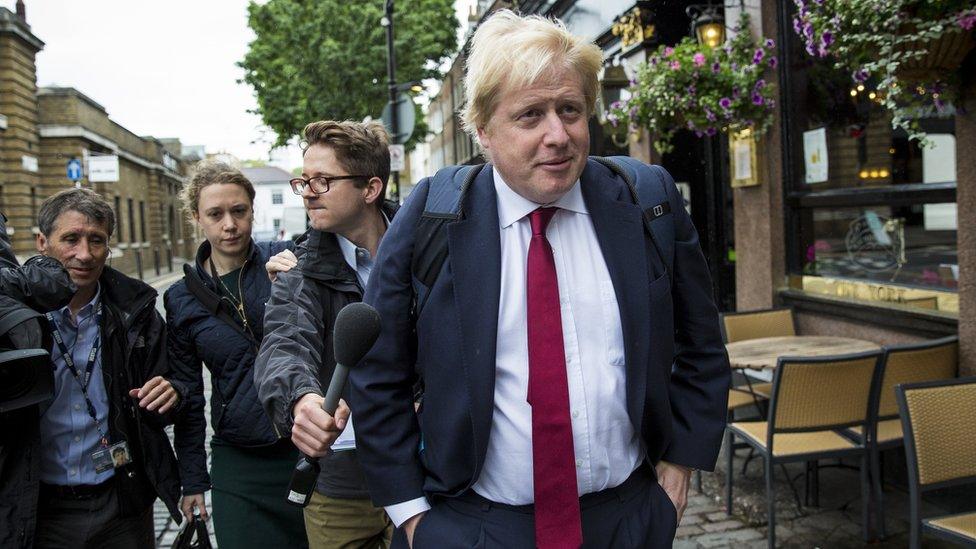Andrea Leadsom: EU citizens in UK are not bargaining chips
- Published
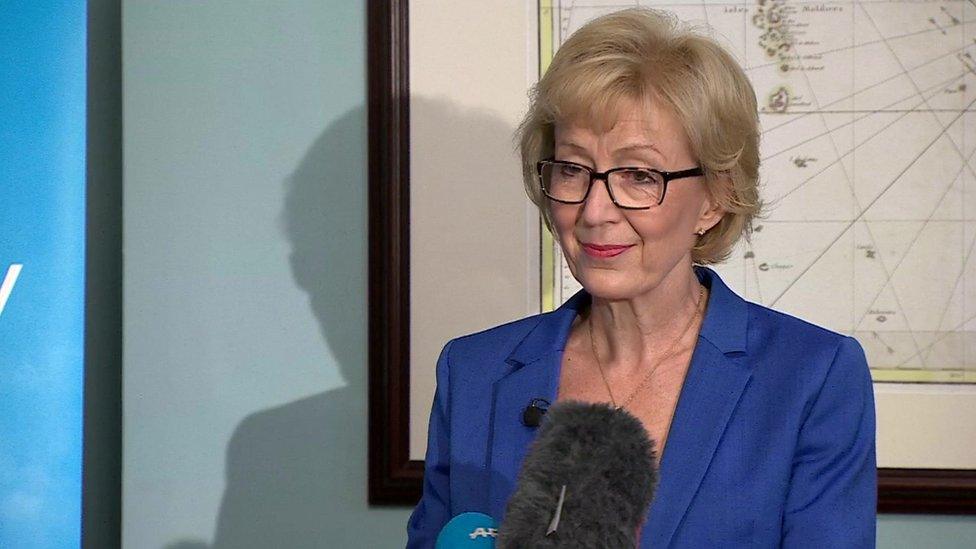
Citizens of other EU countries living in the UK cannot be "bargaining chips" in Brexit negotiations, Tory leadership contender Andrea Leadsom has said.
The UK's foreign secretary had said it would be "absurd" to guarantee a right to stay in the UK before a reciprocal deal was done for UK expats in the EU.
Mrs Leadsom said the rights of EU people already in the UK to stay must be protected.
Meanwhile, her candidacy has received the backing of Boris Johnson.
The former London mayor - whose leadership hopes were dashed after Michael Gove launched his own bid with a stinging attack on his fellow Brexit campaigner - said Mrs Leadsom had the "zap, drive and determination" needed to be prime minister.
Downing Street said there would be "no immediate change" in the status of EU nationals living in the UK.
A Number 10 spokeswoman said there would be "complex issues" when the UK leaves the EU, adding that negotiations would be for the next prime minister.
Mrs Leadsom's pledge to protect EU citizens in the UK was echoed by her leadership rival Stephen Crabb, who backed the Remain campaign in the referendum. He said he would not use them as "negotiating chips" in Brexit negotiations.
Liam Fox and Michael Gove, who backed the exit campaign, have also vowed to allow EU citizens to remain in the UK if they become PM.
Home Secretary Theresa May, echoing the position set out by the foreign secretary, has suggested that the status of existing EU residents in the UK could be part of Brexit negotiations.
Mrs Leadsom - an energy minister - is one of five hoping to succeed David Cameron as Tory leader and PM.
The first ballot of Tory MPs takes place on Tuesday with the last place candidate drops out with votes continuing on Tuesdays and Thursdays until there are two who go forward to a vote of all Conservative members.
The eventual outcome is due on 9 September.
Launching her leadership bid, Mrs Leadsom - who was won the backing of a number of other senior Conservatives including Iain Duncan Smith and John Redwood - said the vote to leave the EU was the biggest political event since the fall of the Berlin Wall.
She sought to reassure those who voted to remain in the EU, saying the country had not, as some people seem to be claiming, "lost our senses, we have just rediscovered our freedom".

Who's in the running?
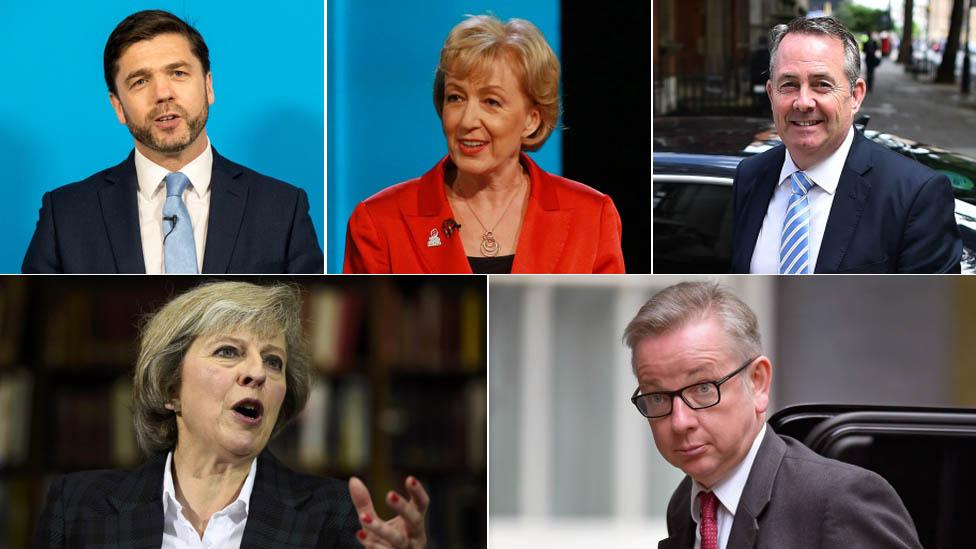
Home Secretary Theresa May: The 59-year-old has replaced Boris Johnson as the bookies' favourite to win the contest. She's held the Home Office brief - often something of a poisoned chalice - since 2010, and is a former Tory party chairman. She says she can offer the "strong leadership" and unity the UK needs, and promised a "positive vision" for the country's future. She backed staying in the EU. Theresa May profile
Justice Secretary Michael Gove: The 48-year-old former newspaper columnist was a key figure in the party's modernisation that led to its return to power in 2010. He was a reforming, if controversial, education secretary between 2010 and 2014, and now holds the Ministry of Justice brief. He was a leading player in the Brexit campaign - which put a strain on his close friendship with David Cameron. He has pitched himself as the candidate that can provide "unity and change". Michael Gove profile
Work and Pensions Secretary Stephen Crabb: The 43-year-old was promoted to the cabinet in 2014 as Welsh secretary, and boosted his profile earlier this year when he took over as work and pensions secretary. A rising star of the Tory party he has promised to unite the party and country following the referendum result and provide stability. Raised on a council estate by a single mother, he has a back story to which many Tory MPs are attracted. Backed Remain. Stephen Crabb profile
Energy minister Andrea Leadsom: The 53-year-old former banker and fund manager was one of the stars of the Leave campaign. A former district councillor, she became MP for South Northamptonshire in 2010 and - after serving as a junior Treasury minister and as a member of the Treasury select committee - she was made a junior minister in the energy and climate change department in May last year. Andrea Leadsom profile
Former cabinet minister Liam Fox: It's second time around for the 54-year-old ex-defence secretary and GP, who came a close third in the 2005 leadership contest. His cabinet career was cut short in 2011 when he resigned following a lobbying row. A Brexit campaigner, and on the right of the party, he has said whoever becomes PM must accept "the instruction" of the British people and not "try to backslide" over EU membership. Liam Fox profile

While she would not put a date on when the UK would begin official negotiations with the EU about exit, she said she wanted to proceed "with urgency" to give businesses certainty and aimed to keep the talks as short as possible.
And she said the current government must do more to reassure existing EU citizens about their rights to continue and live and work in the EU as well as British citizens living elsewhere in the EU.
Earlier on Monday Foreign Secretary Philip Hammond said it would be "absurd" to guarantee at this stage that EU nationals could continue living in Britain after the UK leaves, saying their status would have to be factored into the terms of Britain's exit.
'Rash'
But Mrs Leadsom, who worked in the City for 25 years before entering Parliament in 2010 and who is currently an energy minister, suggested such talk was "rash" and tantamount to "scaremongering".
"I commit today to guaranteeing the rights of our EU friends who have come here to live and work," she said. "We must give them certainty there is no way they will be bargaining chips in our negotiations."
Downing Street said there would be "no immediate change" in their status. A spokeswoman said there would be "complex issues" when the UK leaves the EU, adding that negotiations would be for the next prime minister.
Mrs Leadsom said if she was elected she would put a Leave supporter in charge of day-to-day preparations for Brexit and consult the opposition parties, as well as the devolved administrations, in negotiations.
Who's backing who?
She made it clear that freedom of movement of EU nationals to come to the UK would end, telling reporters under her leadership "the British Parliament will decide each year how many people enter the UK to live, work and contribute to our national life".
Setting out her reasons for standing, she said it had been difficult decision but "I know I can do the job".
Pledging to tackle corporate pay-offs and other forms of City excess, she said the "rich would not be a priority" for her. In contrast, she said improving the "emotional health" of the nation was a passion of hers and would be pouring extra funding into early years education.
"I know I can seize the great opportunities for the UK in leaving the EU," she said. "I know how to strike deals in tough negotiations. I know as a woman how to succeed in a man's world."
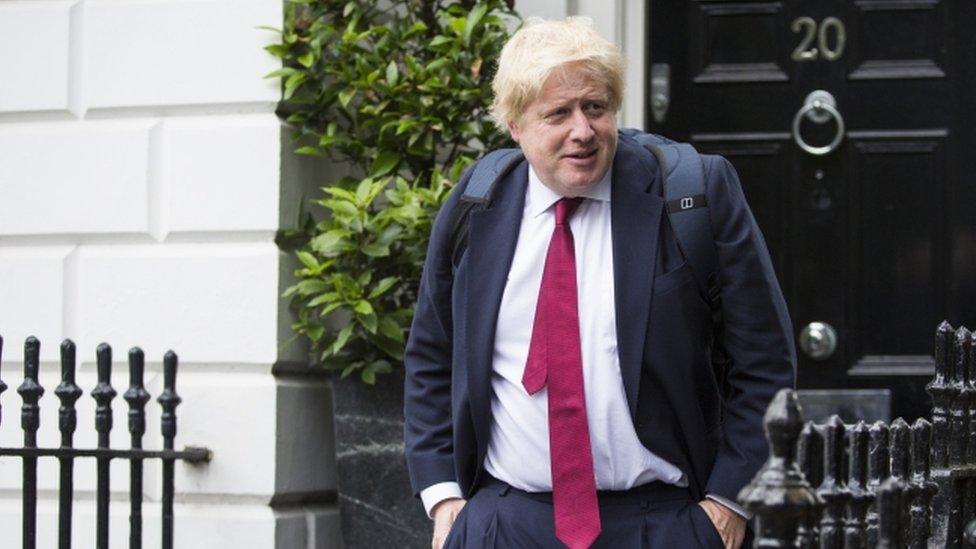
Mr Johnson has thrown his weight behind Andrea Leadsom, describing her as "level headed and trustworthy"
In her speech, Mrs Leadsom also ruled out an early general election if she won the leadership and dismissed claims that she was UKIP's preferred candidate to become PM, insisting she had "no allegiances" to the Tories' political rivals.
Announcing his support for Mrs Leadsom on Monday evening, Boris Johnson said she was "level headed, kind and trustworthy".
"She has specialised in the EU question and successfully campaigned for Leave and will be therefore well placed to help forge a great post-Brexit future for Britain and Europe," he added.
He also said she had the qualities" needed to unite the party."
- Published19 June 2016
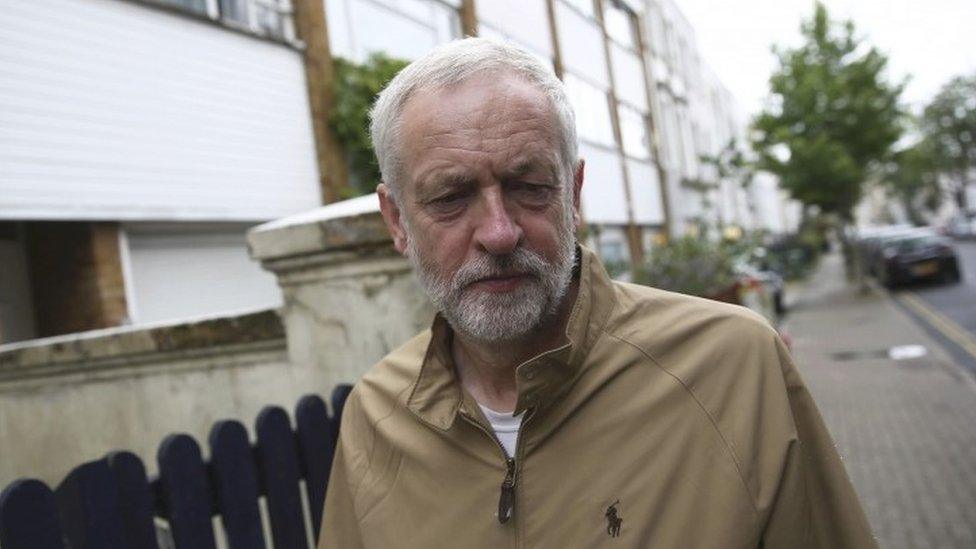
- Published4 July 2016
